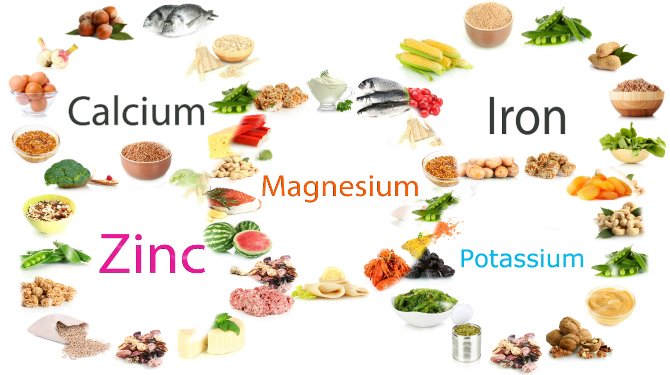Minerals for health

In the realm of nutrition, we often emphasise the importance of vitamins, but minerals are equally crucial for our well-being. While they may not form the sturdy structures we associate with metals in everyday objects, minerals play essential roles in our bodies, particularly in activating enzymes that carry out vital functions.
Let’s delve into the essential metals and minerals that our bodies rely on, their functions, and the importance of maintaining adequate intake levels for optimal health.
Calcium:
Calcium is not just about strong bones and teeth; it’s a multitasker in the body. From regulating blood pressure to enabling muscle contractions and nerve transmissions, calcium is involved in numerous physiological processes.
Chromium:
This mineral helps maintain steady blood sugar levels and facilitates energy extraction from blood sugar, making it crucial for overall energy metabolism.
Copper:
Copper is vital for metabolising fuel, producing red blood cells, regulating neurotransmitters, and combating free radicals, contributing to various aspects of our health.
Iron:
Iron plays a central role in oxygen transport, as it’s a key component of haemoglobin in red blood cells. It’s also involved in enzyme activation, amino acid synthesis, and hormone production.
Magnesium:
Similar to calcium, magnesium is essential for bone health, but it also regulates blood pressure, blood sugar, muscle and nerve function, blood clotting, and enzyme activity.
Manganese:
Involved in bone formation and the metabolism of amino acids, cholesterol, and carbohydrates, manganese contributes to overall metabolic health.
Molybdenum:
This mineral activates enzymes that detoxify harmful substances and prevent the accumulation of sulphites in the body, supporting our natural detoxification processes.
Potassium:
Potassium is crucial for fluid balance, maintaining a regular heartbeat, muscle contraction, and potentially bone health and blood pressure regulation.
Sodium:
While often demonised for its association with high blood pressure, sodium is necessary for fluid balance, nerve singling, and muscle function.
Zinc:
Zinc plays diverse roles in the body, from blood clotting and protein synthesis to immune function, wound healing, and cell division.
Meeting Your Mineral Needs:
While a balanced diet should ideally provide all the essential minerals we need, certain populations may require supplements to address deficiencies. However, caution is warranted, as excessive intake of mineral supplements can have adverse effects.
For instance, excessive iron supplementation can lead to oxidative stress, potentially contributing to heart and liver diseases. Similarly, high doses of calcium supplements may increase the risk of kidney stones and cardiovascular issues.
Instead of relying solely on supplements, prioritise obtaining minerals from food sources whenever possible. For calcium supplementation, opt for low doses to complement dietary intake, and consider adding vitamin D supplements to enhance calcium absorption.
Pay attention to intake
If you fall into any of those high-risk categories, you may want to make a concerted effort to consume enough healthy minerals (see “Gold-medal sources of dietary minerals”).
These are the recommended targets for the minerals in which people are most likely to be deficient:
- Calcium: Men need 1,000 mg per day until age 70, and 1,200 mg after that. Women ages 51 or older need 1,200 mg of calcium per day.
- Iron: 8 mg per day for adult men and for women starting at age 50 (or whenever menstruation ends).
- Magnesium: 420 mg per day for men 31 or older, and 320 mg per day for women 31 or older.
- Potassium: 4,700 mg per day.
sources of minerals
- Calcium: Yogurt, cheese, milk, tofu, sardines, salmon, fortified juices, and leafy green vegetables such as broccoli and kale (but not spinach or Swiss chard, which contain binders that lessen absorption).
- Iron: Red meat, cooked soybeans, pumpkin seeds, cooked lentils, ground turkey, and fortified bread and breakfast cereals.
- Magnesium: Almonds, green vegetables such as spinach and broccoli, soybeans, peanut butter, sunflower and other seeds, halibut, whole-wheat bread, and milk.
- Potassium: Raisins, baked potatoes (with the skin), tomatoes, cooked black beans, plain low-fat yogurt, bananas, and spinach.
for more health tips Clickhere
Wow, this article totally blew my mind! I never knew someone could make vegan cooking sound so exciting. Definitely trying out that quinoa salad recipe!
As a fellow introvert, I totally relate to your experiences. It’s comforting to know I’m not the only one who prefers a cozy night in with a good book over a crowded party. Cheers to embracing our inner hermits!
I never thought I’d be interested in urban gardening until I read your post. You make it sound so accessible and rewarding—I might just give it a try this weekend. Thanks for the inspiration!
As a fellow introvert, I totally relate to your experiences. It’s comforting to know I’m not the only one who prefers a cozy night in with a good book over a crowded party. Cheers to embracing our inner hermits!
Thanks for your article. Another item is that just being a photographer requires not only problems in catching award-winning photographs but in addition hardships in acquiring the best digicam suited to your requirements and most especially issues in maintaining the caliber of your camera. This is certainly very true and clear for those photography addicts that are in capturing the actual nature’s interesting scenes – the mountains, the particular forests, the particular wild or perhaps the seas. Going to these exciting places unquestionably requires a video camera that can meet the wild’s nasty setting.